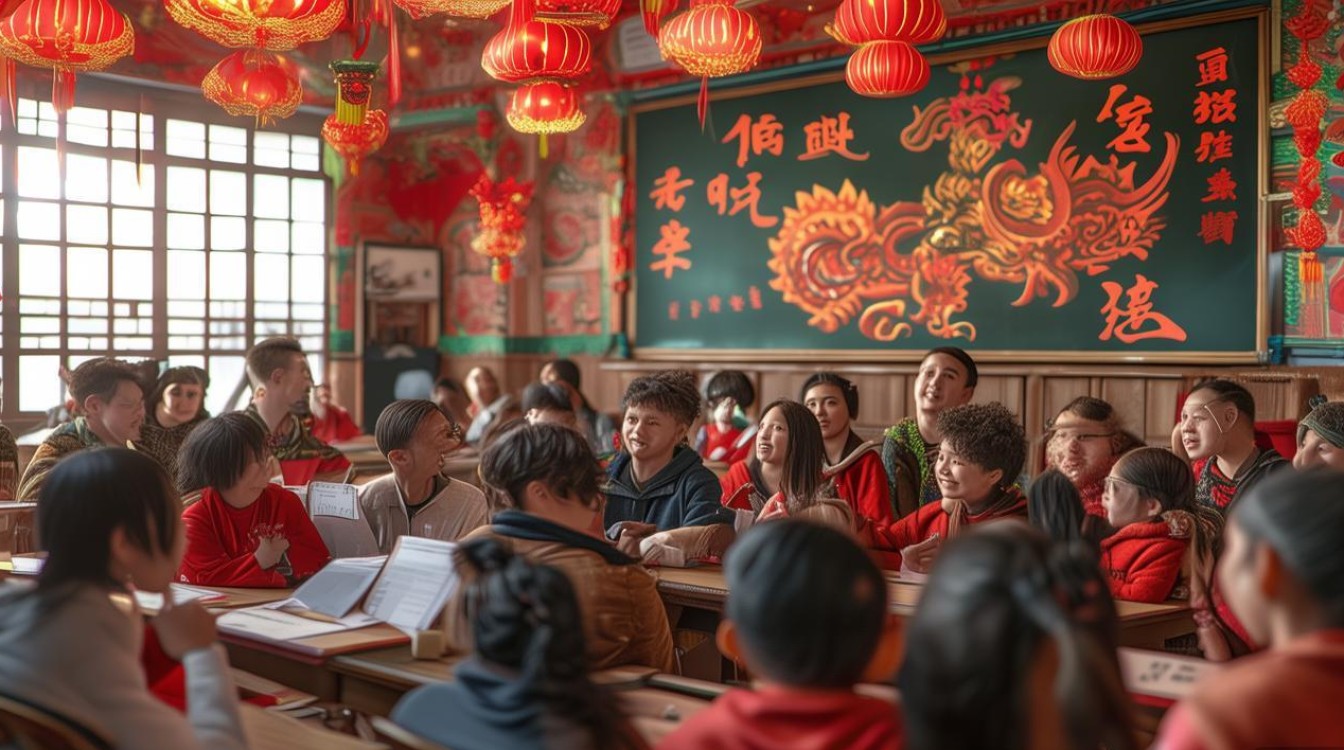下面我为你提供一个全面的备考指南,包括高分词汇、地道表达、不同部分的回答思路和范例,并附上一些实用建议。

核心词汇与地道表达
掌握这些词汇能让你的回答更生动、更地道。
春节相关名词
- The Spring Festival / Chinese New Year: 春节 (两者都可以,Spring Festival 更正式)
- Lunar New Year: 农历新年 (更广泛的说法,韩国、越南等也过)
- Reunion Dinner: 团圆饭 (最重要的晚餐)
- Red Envelopes (Ang Pao / Hongbao): 红包 / 利是 (Ang Pao 闽南语/粤语说法,Hongbao 普通话说法)
- Couplets (Chunlian): 春联
- Paper-cuttings (Jianzhi): 剪纸
- Lanterns: 灯笼
- Firecrackers: 鞭炮
- Zodiac Sign: 生肖 (e.g., the Year of the Dragon - 龙年)
- Dumplings (Jiaozi): 饺子
- Glutinous Rice Cake (Niangao): 年糕 (谐音 "年年高")
动词与短语
- To celebrate / To observe: 庆祝
- To get together / To reunite: 聚会 / 团聚
- To decorate: 装饰
- To set off fireworks: 放烟花
- To pay a New Year call (Bainian): 拜年
- To clean the house: 扫房 (有“扫除晦气”的含义)
- To stay up late on New Year's Eve (Shousui): 守岁
形容词与感受
- Joyful / Festive / Lively: 欢乐的 / 节日的 / 充满活力的
- Heartwarming: 温暖人心的
- Vibrant: 充满生机的
- Traditional: 传统的
- Meaningful: 有意义的
- Loud and boisterous: 喧闹的
分部分备考策略与范例
Part 1: Introduction and Interview
这部分问题比较简单,目的是让你放松,回答要简洁、自然、有个人色彩。
常见问题及回答思路:
Q1: Do you celebrate the Spring Festival?
- 思路: 先直接回答“是”,然后简单说明一下你通常怎么过,或者春节对你的意义。
- 范例:
"Absolutely! The Spring Festival is, without a doubt, the most important holiday for me and my family. It's a time when we can all take a break from our busy lives and truly reconnect."
Q2: How do you usually celebrate it? / What do you do during the Spring Festival?
- 思路: 不要只说“吃饺子、放鞭炮”,用时间顺序或活动类别来组织你的答案,可以说说节前、节中、节后的活动。
- 范例:
"Well, my family has a pretty traditional routine. A few days before the festival, we do a thorough cleaning of our house, which we call 'sweeping the dust', to get rid of the old and welcome the new. On New Year's Eve, the highlight is definitely the reunion dinner. We gather at my grandparents' place and enjoy a big feast with dishes like dumplings and fish. After dinner, we usually watch the Spring Festival Gala on TV and stay up late. On the first day of the new year, we visit our relatives and friends to exchange greetings and 'lucky money' in red envelopes."
Q3: Do you like the Spring Festival? Why? / What's your favorite part about it?
- 思路: 先给出明确观点(喜欢/不喜欢),然后用 1-2个理由 来支撑,并加入个人感受。
- 范例 (喜欢):
"I love it, for sure. My favorite part has to be the sense of togetherness. In our fast-paced modern life, it's rare for the whole family to be in one place. Seeing my cousins, aunts, and uncles all together, sharing stories and laughter, is just incredibly heartwarming."
- 范例 (如果不喜欢,可以说挑战,但要委婉):
"It's a bit of a mixed feeling for me, to be honest. While I cherish the time with my family, I find the preparation a bit stressful. The shopping, the cooking, and especially the 'red envelope' pressure can be quite exhausting sometimes. But the joy of seeing everyone happy makes it all worthwhile."
Q4: Is it celebrated differently now compared to the past?
- 思路: 对比过去和现在,可以说形式变了,但核心精神没变。
- 范例:
"Yes, definitely. In the past, celebrations were much more about traditional customs, like setting off loud firecrackers all night. Nowadays, due to safety and environmental concerns, that's less common, especially in big cities. Also, a lot of people, including my parents, now prefer to travel during the holiday instead of staying at home. However, the core spirit of the festival—reunion and family love—remains exactly the same."
Part 2: Long Turn
你有一分钟时间准备,可以记一些关键词,回答要结构清晰、细节丰富、有故事性。
Cue Card 示例:
Describe a traditional festival in your country. You should say:
- what festival it is
- when it is celebrated
- how people celebrate it
- and explain how you feel about this festival.
回答思路与框架 (1分钟笔记):
- What: Spring Festival (最重要的传统节日)
- When: Lunar New Year's Day (农历正月初一), Eve is most important (除夕最重要)
- How:
- Eve: Reunion Dinner (团圆饭), Dumplings (饺子), Watch Gala (看春晚), Shousui (守岁)
- Day 1: Red Envelopes (红包), Visit relatives (拜年), Say "Gong Xi Fa Cai" (说恭喜发财)
- Decorations: Red couplets (春联), lanterns (灯笼)
- Feelings: Heartwarming (温暖), Family bond (家庭纽带), Look forward to it (期待)
完整回答范例:
"I'd like to talk about the Spring Festival, which is undoubtedly the most significant traditional festival in China.
It's based on the lunar calendar, so the date changes every year, but it usually falls in late January or February. While the official holiday starts on the first day of the lunar new year, I personally feel that the most magical and important part is actually the New Year's Eve.
The celebration on that day is all about family. My whole family, including my grandparents, aunts, uncles, and cousins, would gather at my grandparents' house. The kitchen would be a hive of activity all day as my mom and aunts prepare a massive feast. The smell of dumplings and braised pork would fill the whole house. After dinner, we would all sit around the TV, chatting and watching the Spring Festival Gala, a national tradition. At midnight, we would set off some fireworks—though not as many as before due to restrictions—and stay up late, which we call 'shousui', to 'guard the year' and welcome the new one.
As for how I feel about it, it's a very profound feeling for me. It's more than just a holiday; it's a powerful reminder of the importance of family and our roots. In our daily lives, we're all so busy with work and studies, but the Spring Festival forces us to slow down, put everything aside, and simply be with our loved ones. Seeing the joy on my grandparents' faces when the whole family is together is truly priceless. That sense of warmth, unity, and renewal is something I look forward to every single year."
Part 3: Two-way Discussion
这部分考察你的分析能力、抽象思维和深度讨论能力,你需要就 Part 2 的话题进行更宏观、更深入地探讨。
常见问题及回答思路:
Q1: Why do you think traditional festivals are important for a society?
- 思路: 从文化、社会、个人多个层面分析。
- 范例:
"I believe they are crucial for several reasons. Firstly, from a cultural perspective, they act as a living link to our history and traditions. Festivals like the Spring Festival are like a time capsule, preserving stories, values, and customs that might otherwise be forgotten. **Secondly











